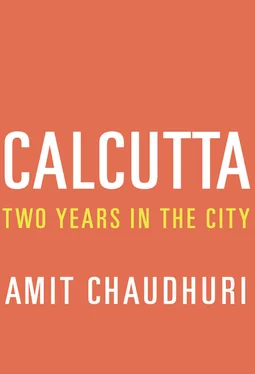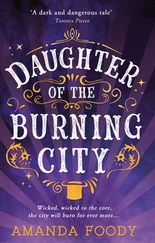I was beginning to feel hungry. I still wanted to go to Bantala, though — partly for its fairy-tale name (“under the tide”), partly because it had been put on my itinerary by Dwaipayan, the political scientist. All these — Kamalgachi, Rajpur, Bantala — were locations, he pointed out, that had undergone a transformation in the local panchayat elections in the last three or four years; they were all steadfast traditional Left bastions that had, only recently, gone the Trinamool way. When I gave him a report at the end of the day, telling him that, to my surprise, I’d encountered nothing but calm and tolerance at the polling booths, he sounded both intrigued and gratified. More than a month later, though, he issued a caveat: “Amit, I think it would be wrong to arrive at any conclusions about these places on the basis of what you saw at the booths at that moment . That’s what they may have been like on that particular day. Traditionally, these are places with a history of political violence. The entire South 24 Parganas area has been volatile for years.” This, despite those names out of which once nursery rhymes and stories must have arisen, when there was darkness after sunset and little of Calcutta as we’ve long known it. “Rajpur,” city of kings; and Bantala, making me think of the child’s rhyme that had transfixed Tagore when he was a boy: “brishti pare tapur tupur/nade elo ban ”; “the rain falls tapur tupur/the flood comes to the river.”
Bantala was on the South’s outer reaches, and a sly diversion off the bypass took me and the driver Biswajit into a clean, slightly desolate road going into the countryside, a canal on the left, in which, he informed me with insider knowledge, shrimps were cultivated; and bright green expanses with power grids and “speed pumps” on the right. I can’t drive; I’d had to bargain with Biswajit to come to work that day. He had to be back by half past two, eat, and then vote — or so he claimed. Then my parents’ driver, Mahinder, who’d voted in the morning, would take me to my two other stops for the afternoon, on what otherwise should have been, for both of them, a day of gossip, discussion, and sleep — for such, for the working man, should be the day when power potentially changes hands. Instead, here was Biswajit at the wheel; and a few drops of kal baishakhi rain had begun to drop stealthily, threateningly, on the windshield. Where to go? For the first time, I felt far from home, because this road wasn’t leading anywhere I knew: it was headed for the coast, and for the Sunderbans, where the tiger still lives. The bus stops made of concrete were sans commuters now — and, here and there, a few jean-clad men and women in salwaar kameez suits stood next to motorcycles, or sat atop the open cycle-drawn carts that are called “vans”; these young people, absorbed in each other, and despite their casual sensual ease, seemed desperately impoverished and to have been plucked out of the wild. It was another world. It was mainly agricultural land that dwarfed these figures, who were neither of the metropolis nor out of it, neither of the land nor of the city — agricultural land that was predestined to be colonised one day, whatever the Trinamool or the Left had planned, by industrial projects. Amidst this paradox of desolation and bounty, we passed an optimistic sign that said MOOD ’N FOOD INDIAN AND CHINESE RESTAURANT — and, then, heralded by some fluttering paper Trinamool and CPI(M) flags threaded round one of the huge trees on the left, there it was on the right: a compound like a crevasse, well below the level of the “highway,” and, further on, near a colourless one-storey building, a long rickety line of voters.
I walked cautiously towards the primary school — that’s what the low building was. It was more basic than the school at Rajpur; it had no more than two or three rooms. The big room, where the polling officers, the presiding officer, and the “micro-observer” from the Election Commission were gathered, overseeing the mildly diffident but perpetual trickle of voters, was the main classroom: the wall on the right had painted on it large black Bengali vowels and a handful of consonants, as well as the face of the godlike educationist of the Bengal Renaissance, Iswar Chandra Vidyasagar.
I wasn’t allowed to ask a single question: the Election Commission had ensured a mood that was sociable and regulatory, festive, but with a respect due to an occasion like, say, public examinations. Bantala clearly had a more notable record of unrest than the other stops on my tour. Feeling that I was impeding the smooth turnover of the queue, I went outside into the compound, where, again, women stretched in one line on the right, the men on the left. There was something resistant about these figures: they weren’t peasantry, and neither were they wholly urban — poverty had made them small and wiry. They didn’t belong to Satyajit Ray’s world, or Bibhutibhushan Banerjee’s, but to a political dispensation under which even the vegetation looked stunted, and the greenery, once you took the “highway” departing Calcutta, grew black with soot and dust. The village Bengal of books and films, a version of which I’d seen in my childhood on the road from the airport to the city, had been made sickly in the last twenty-five years — although its naturally bountiful colours still looked lush from the aeroplane window. These people were of, and like, that landscape, economically unviable but politically alive — they were what was left of that pastoral.
Were these people from Calcutta, though? Strictly speaking, I was still in the city. But throughout that day, during which I moved from the more far-flung southern reaches back to middle-class Ballygunge, voting in the afternoon with R, dropping her home at Sunny Park, and then being driven by Mahinder into the narrow lanes of Dum Dum-Rajarhat in the north, just as the elections were winding down after four o’clock, I felt the presence of a new city that had come up where the old had been. To be in it was not to be any closer to comprehending it than when I’d studied it from the aeroplane window a few days ago, with its once-magical clusters of plantain and palm trees and small terraced houses. Mamata Banerjee fits in well here, having emerged, like this tentative city itself, and the people I’d met on election day, without a past, and without that enervating legacy of humanism and high culture. As to whether she would give it a future we would discover on 13th May, when the results would be declared, and in the long-anticipated years to follow.
In April 1999, almost as soon as my fellowship in Cambridge in England came to an end, I transferred what worldly possessions I couldn’t ship back to India — mainly studenty things, plates from a Latin American shop, posters, a CD player — into the damp New Court cellars at St. John’s College. Panting at the end of the Herculean undertaking, I felt ready to surrender to the fantasy that had gripped me for almost two decades: of returning “home,” to India. But, for more than one reason, I didn’t close my bank account on King Street. Fed up though I was with what Thatcher and Blair had done, between themselves, to Britain, I wasn’t ready to give it up altogether. I also had some inkling that neither India nor Calcutta, my birthplace, was the sort of nation and city to receive their returning sons emotionally, with open arms.
In fact, I was welcomed, on my arrival, by a negative review of Freedom Song (which had been published seven or eight months earlier) in the Statesman , still, at the time, Calcutta’s leading English-language daily. Reviewing is often a form of thuggery in Anglophone India, territorial, threatening, a way of roughing somebody up; and the Books pages are a bit like a lawless part of town, from which you have to be thankful to slip away with your writerly life — not to mention your dignity — intact. This review, which my father had kept from me, and which had shocked him slightly, had begun by quoting from Plato, and proceeded to claim that “novel is dead” after Angela Carter and Salman Rushdie. My poor novel — an example of the genre that had the temerity to persist after its demise — had been called an “entomologist’s notebook,” and its characters compared to stick insects. To add to these insults was the insult of the review being quite poorly written by the Plato-reading reviewer, bristling with bad syntax and self-importance, and unaware of its missing articles. At thirty-seven, I was still young, but not entirely surprised. But some wishful part of me had longed for a warmer greeting.
Читать дальше












